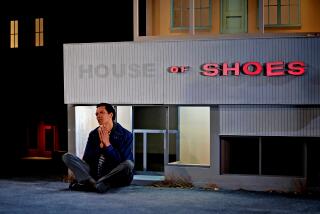A TALE OF LIFE AND DEATH
SAN DIEGO — The acceptance of one’s impending death, or that of a loved one, is a difficult passage unwillingly crossed. Michael Cristofer takes three families through just that process in his 1977 Pulitzer Prize- and Tony Award-winning drama, “The Shadow Box.” Remarkably, he manages to lead his characters past despair to an affirmation of love and of life.
This compelling play is quietly and effectively realized in the Bowery Theatre production, playing through April 26.
The three patients, all dying of unstated causes, are as different from each other as can be.
Joe, a simple working-class man, eagerly awaits a visit from his wife and teen-age son; Felicity, an elderly woman with a prickly and demanding disposition, drives her patient daughter, Agnes, nearly to distraction; and Brian, a deeply compassionate intellectual, is hovered over protectively by his young lover, Mark.
All three live in cottages at a countryside retreat for the hopeless cases. Joe’s wife, Maggie, hates the whole idea of Joe being in the cottage. When she arrives, she sits on the porch and refuses to go in, telling him he looks fine and that she wants him to come home with her. She even tries to bribe him, telling him she has bought a red reclining chair for the living room, just the kind he always wanted.
In contrast, Agnes does not deny her mother’s illness. Her struggle is with Felicity’s incessant demands and complaints, which are wearing her down to the point where she wishes her mother would die.
Complicating Brian’s and Mark’s lives is a surprise visit from Brian’s trampy ex-wife, Beverly, a vision of cheap glitter in a blizzard of necklaces, medals and bracelets all fighting for space on a red siren of a dress precariously slipping off her shoulders.
Mark takes an immediate dislike to her, and for good reason. This seemingly breezy free spirit has come to jockey for the right to keep watch by Brian’s deathbed.
The three stories occupy the same stage in alternating segments. Each favors a different part of the stage, which is artfully and starkly designed by J.A. Roth in three different colors of wood.
The stories weave in and out of each other, sometimes with a character in one story repeating or expanding upon the words of another character in a different story. The timing of director Carla Waggoner-Gundy creates a smooth flow that builds, near the end, like a fugue.
The show features rich, substantive acting roles. Most of the actors take their parts and feast on them.
One of the most interesting and arresting performances is turned in by Allen Bridgwater as Brian. Bridgwater is a paraplegic, and though his part was not written for a man in a wheelchair, the casting here seems fortuitous. Bridgwater’s intelligent and graceful portrayal of a civilized man trying to philosophize and thereby distance himself from a messy and painful death makes it work on his own terms.
Bridgwater doesn’t get all the support he needs from Bruce Redden as Mark. Redden is handsome and likable and works hard, but the problem is that you can see him working. Jim Johnston is a solid down-home Joe and Craig Dorsey is good and gawky as his teen-age son. Michael Kubik strikes just the right tone as the off-stage interviewer who punctuates the action by asking one character, then another, about his feelings.
But with the exception of Bridgwater, it is the women who do most of the sparkling. Crystal Goodman, with her frazzled red hair and faded blue dress, plays a touchingly nervous Maggie; Jackie Bensinger is appealing as the self-mocking, been-through-it-all Beverly; Joyce Rue projects a powerful beam of love as the long-suffering Agnes, and Mary M. Egan is a marvel as Felicity, running the gamut from impossible to wrenching as she moves between dictatorial obstinacy and sweet-voiced senility.
The original music by Lawrence Czoka is plaintive and haunting. Sean La Motte’s lighting moves deftly from story to story and Roxanne C. Femling’s costumes evocatively suggest the characters’ varied backgrounds.
It was Bridgwater who brought the idea of doing “The Shadow Box” to the Bowery Theatre. The idea was, most definitely, a good one. “THE SHADOW BOX”
By Michael Cristofer. Directed by Carla Waggoner-Gundy. Original music by Lawrence Czoka. Set by J.A. Roth. Costumes by Roxanne C. Femling. Lighting by Sean La Motte. Producing director is Allen Bridgwater. Stage manager is Tom Phelps. With Michael Kubik, Jim Johnston, Craig Dorsey, Crystal Goodman, Allen Bridgwater, Bruce Redden, Jackie Bensinger, Mary M. Egan and Joyce Rue. At 8 p.m. Wednesday-Saturday and at 7 p.m. Sunday through April 26. At the Bowery Theatre, 480 Elm St., San Diego.
More to Read
The biggest entertainment stories
Get our big stories about Hollywood, film, television, music, arts, culture and more right in your inbox as soon as they publish.
You may occasionally receive promotional content from the Los Angeles Times.










